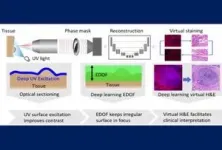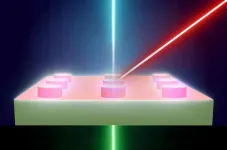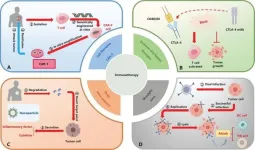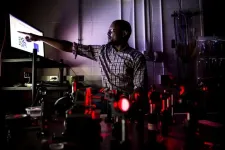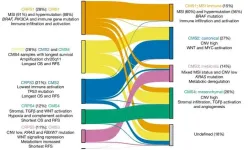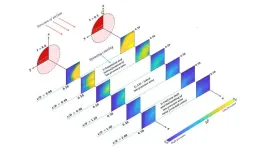(Press-News.org) Depression is common among people with likely incurable cancer – understandably so. But studies have shown that it can be treated, and if the goal is for individuals to be able to engage as much as possible with family, friends, hobbies or whatever gives them joy and purpose in whatever amount of time they have, then treating depression becomes imperative.
That’s not so easy, though, as patients may face a shortage of mental health workers, difficulties with transportation and continuing stigma around mental health issues.
Evan Graboyes, M.D., a head and neck surgical oncologist and director of Survivorship and Cancer Outcomes Research at MUSC Hollings Cancer Center, and Jennifer Dahne, Ph.D., a licensed clinical psychologist and leader of the Behavioral Health Innovations Lab at Hollings, have teamed up to create a new model of care delivery to reach out to this specific group of patients proactively and provide timely and tailored mental health treatment.
Together, they have received a $3.1 million grant from the National Cancer Institute (NCI) to test their model in a clinical trial through the Hollings Cancer Network. The grant from the NCI builds upon a smaller pilot project funded by Hollings to develop the idea.
Depression among cancer survivors
“There are more and more people who now experience cancer as a chronic disease that is managed with treatments over the course of many, many years,” Graboyes explained. “There's a lot we don't know about this growing yet understudied subpopulation of cancer survivors. However, we do know that depression is one of the most important toxicities experienced by this group of people who are on therapies for a long time.”
This group includes people whose cancer was already advanced at the time they were diagnosed or whose cancer became advanced or metastasized after initial treatment. With modern therapies, their cancer can be controlled, perhaps for years, but doctors can’t completely eradicate it.
In fact, up to half of people with likely incurable cancer report depressive symptoms. That can lead to reduced quality of life, lower adherence to recommended treatments and higher suicidal ideation.
Proactive depression treatment
Graboyes and Dahne want to get proven treatments for depression to this patient group more quickly and in a more accessible way.
Waiting for a patient’s next appointment to then screen for depression and make a referral isn’t the most effective way, Graboyes said. And setting up a series of appointments at specific recurring intervals isn’t necessarily helpful for this group, as their depression may come and go.
Instead, Dahne and Graboyes envision a system where the patient in need is automatically identified through the electronic health record and prompted to enroll in a remote depression treatment program that they can access on an as-needed basis.
In her own research and clinical care, Dahne developed a mobile app-based treatment called “Moodivate” that delivers a form of therapy called behavioral activation. She’s now wrapping up a study of its effectiveness in more than 600 people identified through primary care who used the app to treat depression.
With input from an advisory group of patients with cancer, Dahne and Graboyes adapted the Moodivate app to fit the unique needs of cancer survivors and preliminarily evaluated the intervention with 30 patients. In the pilot, the researchers saw a level of adherence so high that it shocked Dahne.
“We followed everyone weekly for four weeks. They had to do an assessment every single week, and we had almost 100% retention,” she said. “I have never experienced that type of engagement from participants in my trials.”
Behavioral activation
“The idea behind behavioral activation is that depression is caused by essentially dropping out of life,” Dahne said. “You stop engaging with the things that used to bring you pleasure and joy and that were important to you.
“That makes a lot of sense with cancer survivors, particularly those who are living with likely incurable cancer. The options of things that you can do narrows as you get sicker. It makes sense that your mood would worsen because of that,” she said.
Behavioral activation doesn’t mandate the same specific actions from every participant. Instead, people are asked to think about what is most important to them. If being a good parent or grandparent is a key value, for example, what can they do on a daily basis to live a life that is well-aligned with that value?
“What are concrete activities that are observable, measurable and the very smallest piece possible that you can schedule and complete to live a value-driven life?” Dahne said. “And then the bread and butter of the treatment becomes scheduling in and completing those activities. And as you engage more in activities that are important to you and are enjoyable to you, then depression improves.”
Having treatment reminders at their fingertips can help people to access care when they need it, even if they live in rural areas without mental health providers or if mental health providers don’t have any open appointment slots.
The majority of Americans, regardless of income, education or geography, have smartphones, making this type of virtual therapy accessible to most people. As a result, Graboyes argues, evidence-based mental health treatment offered via a smartphone platform can actually improve health equity and diminish disparities in access to care and outcomes.
"With trials that are done remotely, we reach out to those patients who are potentially most medically vulnerable. It's a way that we can reach those in greatest need, as opposed to the ones who are capable of traveling, who may not be the ones who actually need help the most,” Graboyes said.
Scaling up to reach more people
In addition to testing how well this therapy works, the researchers will be developing a natural language processing model to identify the patients who should be invited to participate in this therapy.
Electronic health records are great for targeting patients within very specific, concrete parameters. For example, the system can be set up to send messages about colonoscopy screening to patients as they reach their 45th birthdays, the age at which colonoscopies are recommended to begin.
But the determination that someone is living with likely incurable cancer is more subtle. It can be found in the provider notes and pathology, or blood test and radiology reports, if you know what you’re looking for.
During the pilot, the researchers manually reviewed charts to find people to invite. But it’s impractical and a poor use of resources to have a surgeon reviewing charts, Dahne pointed out, especially if the hope is that this type of program could be scaled up to reach thousands of patients.
Instead, they want to train a natural language processing model to be able to pick out the same patients that a human reviewer would choose.
If successful, this would have benefits beyond this particular study. It could be used by Hollings and other cancer centers to understand more fully how many people are living with likely incurable cancer and to offer other survivorship resources.
“This is just the first step,” Dahne said. “We hope that other types of digital interventions that address other mental health or cancer survivorship needs could be inserted into this same paradigm.”
About MUSC Hollings Cancer Center
MUSC Hollings Cancer Center is South Carolina’s only National Cancer Institute-designated cancer center with the largest academic-based cancer research program in the state. The cancer center comprises more than 140 faculty cancer scientists and 20 academic departments. It has an annual research funding portfolio of more than $50 million and sponsors more than 200 clinical trials across the state. Dedicated to preventing and reducing the cancer burden statewide, the Hollings Office of Community Outreach and Engagement works with community organizations to bring cancer education and prevention information to affected populations. Hollings offers state-of-the-art cancer screening, diagnostic capabilities, therapies and surgical techniques within its multidisciplinary clinics. Hollings specialists include surgeons, medical oncologists, radiation oncologists, radiologists, pathologists, psychologists and other clinical providers equipped to provide the full range of cancer care. For more information, visit hollingscancercenter.musc.edu.
END
National Cancer Institute awards grant to Hollings researchers focused on depression among cancer survivors
2024-08-13
ELSE PRESS RELEASES FROM THIS DATE:
MSK Research Highlights, August 13, 2024
2024-08-13
New research from Memorial Sloan Kettering Cancer Center (MSK) found patients with non-small cell lung cancer brain metastases may benefit from up-front stereotactic radiosurgery; identified a connection between antibiotic use and autoimmune diseases; and uncovered a previously unknown structural role for messenger RNAs in the cytoplasm of cells.
Patients with non-small cell lung cancer brain metastases may benefit from upfront stereotactic radiosurgery
For patients with non-small cell lung cancer that has spread to the brain, targeted therapies called ...
Study finds that dopaminergic medication improves sleep quality in Parkinson’s disease patients
2024-08-13
A study involving 22 Parkinson’s disease (PD) patients has shown that use of the dopaminergic drug levodopa improves sleep quality. When the patients took the drug, the number of times they woke up during the night fell 25% and the amount of time they remained awake fell 30% on average.
The investigation was conducted with FAPESP’s support by researchers at São Paulo State University (UNESP) in Brazil, and the University of Grenoble Alpes (UGA) in France. An article reporting the results is published in ...
Breakthrough in nanotechnology: Viewing the invisible with advanced microscopy
2024-08-13
Tailoring light with Nanomaterials
Metamaterials, engineered at the nanoscale, exhibit unique properties not found in naturally occurring materials. These properties arise from their nanoscale building blocks, which, until now, have been challenging to observe directly due to their size being smaller than the wavelength of light. The team's research overcomes this limitation by employing a new microscopy technique that can simultaneously reveal both the nano and macro structures of these materials.
A New Window into the Nano World
The key finding of this research is a methodological breakthrough that enables the visualization of structures previously too small to be seen ...
Tackling cancer from the inside out: A deep dive into immune checkpoint inhibitors
2024-08-13
In the past two decades, immune checkpoint inhibitors (ICIs) have revolutionized cancer treatment, showing promising results against various solid tumors. This study reviews recent developments in ICIs, focusing on new targets like T cell immunoreceptor with Ig and ITIM domains (TIGIT), T cell immunoglobulin and mucin domain-containing protein 3 (TIM-3), and lymphocyte activation gene-3 (LAG-3). These targets aim to overcome resistance mechanisms limiting the effectiveness of current therapies, such as anti-PD-1 and anti-CTLA-4. By identifying and developing these new ...
RPI Physicist Moussa N’Gom is using light to enhance nuclear security
2024-08-13
Our nation’s security depends on the effective detection of nuclear materials at our borders and beyond. To address this challenge, Rensselaer Polytechnic Institute (RPI) physicist Moussa N’Gom, Ph.D., is leading research aimed at developing a quantum sensing probe to detect and characterize special nuclear materials precisely and without contact. Special nuclear materials are only mildly radioactive but can be used in nuclear explosives.
The research is being conducted through RPI’s participation in the Consortium ...
The atmosphere in the room can affect strategic decision-making, study finds
2024-08-13
The atmosphere within a group can influence the outcome of strategic decision-making, according to a new study co-authored by Bayes Business School (formerly Cass).
Paula Jarzabkowski, Professor of Strategic Management at Bayes, along with researchers from University of Queensland, Macquarie University and Leuphana University of Lüneburg, found that different atmospheres led to people speaking and interacting in different ways that changed how they made sense of the strategy.
For instance, when the atmosphere was pensive, people were cautious about the way to proceed, whereas, when it was curious they felt ...
Study uncovers mutated driver genes in colorectal cancer: 9 novel to CRC and 24 previously undetected in any cancer
2024-08-13
The Institute of Intelligent Medical Research (IIMR) of BGI Genomics, in collaboration with Sweden’s Uppsala University, has published the largest multi-omics study of colorectal cancer (CRC) to date. The study aimed to understand the functional and prognostic impact of cancer-causing somatic mutations, revealing new genetic alterations and developing a new molecular classifier of tumor variants. This research was published in the journal Nature on August 7th, 2024.
Unveiling New Genetic Landscapes
The researchers analyzed the whole genomes and transcriptomes ...
Cricket physics: Science behind the modern bowler technique tricking batters
2024-08-13
WASHINGTON, Aug. 13, 2024 – Key to winning a cricket match is tricking the other team’s batters – no small feat as bowlers bowl cricket balls nearly 100 miles per hour. In recent years, a bowling technique that has become popular involves keeping the arm almost entirely horizontal during delivery, notably used by Sri Lankan stars Lasith Malinga and Matheesha Pathirana. The aerodynamics of such deliveries have perplexed sports physicists.
In Physics of Fluids, by AIP Publishing, researchers have started to unravel the mysteries of how ...
Measuring Martian winds with sound
2024-08-13
WASHINGTON, Aug. 13, 2024 – Mars has a notoriously inhospitable environment, with temperatures that fluctuate dramatically over the course of a Martian day and average minus 80 degrees Fahrenheit. Its surface is mostly covered in red dust, with terrain typified by craters, canyons, and volcanoes. And its atmosphere is extremely thin, comprising only about 1% of the density of Earth’s.
Needless to say, measuring wind speeds on the red planet is challenging. Martian landers have been able capture measurements — some gauging the cooling rate of heated materials ...
Posttraumatic stress disorder and type 2 diabetes outcomes in veterans
2024-08-13
About The Study: The findings of this cohort study of patients with comorbid posttraumatic stress disorder (PTSD) and type 2 diabetes suggest that PTSD is a modifiable risk factor associated with a modest reduction in microvascular complications. Further research is needed to determine whether findings are similar in non-Veterans Health Administration health care settings.
Corresponding Author: To contact the corresponding author, Jeffrey F. Scherrer, PhD, email jeffrey.scherrer@health.slu.edu.
To access the embargoed study: Visit our For The Media website at this link https://media.jamanetwork.com/
(doi:10.1001/jamanetworkopen.2024.27569)
Editor’s ...

